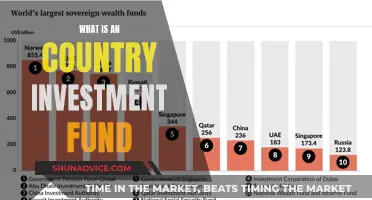
Hedge funds are a type of investment vehicle that pools money from private investors, which is then managed by professional fund managers. These funds are known for their high minimum investment requirements, targeting wealthy investors. The funds are often regarded as risky, employing strategies such as leverage and the use of derivative securities. While hedge funds can provide the potential for above-average returns, they also come with higher fees and a lack of liquidity, as investors' money is typically locked up for a year or more. The ultra-wealthy may choose to avoid hedge funds due to their high fees, the availability of other investment options, and their focus on preserving their wealth rather than taking on additional risks.
| Characteristics | Values |
|---|---|
| High fees | 2% management fee and 20% performance fee |
| High minimum investment | Accredited investors with a high minimum investment or net worth |
| Illiquid | Investments are locked up for a year before shares can be sold and funds withdrawn |
| Risk | Considered a risky investment choice |
| Investor type | Target wealthy investors |
What You'll Learn

Hedge funds are risky and require large minimum investments
Hedge funds are considered risky investments. They use a variety of strategies, including leverage (borrowed money) and the trading of non-traditional assets, to pursue above-average returns. They are actively managed funds that focus on alternative investments and often employ risky investment strategies. Hedge funds are loosely regulated and can invest in options, derivatives, and esoteric investments that mutual funds cannot access. This lack of strict regulation allows them to take greater risks in pursuit of higher returns.
The minimum investment requirements for hedge funds are typically high. They usually target wealthy investors or institutional investors, such as pension funds and insurance companies. An investor in a hedge fund is commonly regarded as an accredited investor, meaning they meet a required minimum level of income or assets. Hedge funds often require accredited investors and a substantial minimum investment amount or net worth.
The standard fee structure for hedge funds is the "2 and 20" model, which includes a 2% management fee and a 20% performance fee. These fees are higher than those charged by conventional investment funds. The management fee is based on the net asset value of each investor's shares, and the performance fee is typically calculated as a percentage of profits.
Hedge funds also impose restrictions on withdrawing funds. Investments in hedge funds are considered illiquid, as they often require investors to keep their money in the fund for a lock-up period of at least one year. Withdrawals may only be permitted at certain intervals, such as quarterly or biannually.
While hedge funds can provide diversification and a hedge against market downturns, they also come with higher risks and fees. The ultra-wealthy may choose to avoid hedge funds due to their high minimum investment requirements, liquidity constraints, and the availability of other investment options that align better with their risk tolerance and financial goals.
Factor Funds: Where to Invest Now?
You may want to see also

They charge higher fees than other funds
Hedge funds employ a standard
In 2022, the average expense ratio across all mutual funds and exchange-traded funds was 0.37%. This means that hedge funds charge fees that are more than 5 times higher than those of other funds.
Hedge funds are loosely regulated by the SEC and are more loosely regulated than competing investments. They can invest in options and derivatives, as well as esoteric investments that mutual funds cannot invest in. This freedom allows them to charge higher fees.
The higher fees charged by hedge funds may be a reason why most ultra-wealthy people do not invest in them.
Hedge Fund Investment Strategies: Where and How They Invest
You may want to see also

Investments are illiquid and require long lock-up periods
Investments in hedge funds are illiquid and require investors to keep their money in the fund for at least a year, a period known as the lock-up period. This means that investors' funds are tied up and inaccessible for a significant amount of time, which can be a challenge for those who need liquidity and quick access to their funds.
During the lock-up period, investors are unable to withdraw their money or sell their shares, limiting their flexibility and control over their investment. This lack of liquidity can be a significant disadvantage, especially for ultra-wealthy individuals who may have complex financial needs and require the ability to access and utilise their funds promptly.
The long lock-up periods in hedge funds also mean that investors are committed to the fund for an extended duration. This can be a concern for those who prefer to have the option to exit an investment quickly if it is not performing as expected or if their investment goals and strategies change. Ultra-wealthy individuals often have dynamic financial situations and may seek more agile and responsive investment opportunities.
Furthermore, hedge funds typically only allow withdrawals at certain intervals, such as quarterly or biannually. This adds a further layer of restriction and inflexibility for investors. The inability to access funds promptly can be a significant drawback, especially for those who may need to respond quickly to market changes, take advantage of emerging opportunities, or adjust their investment strategies.
The illiquid nature of hedge fund investments and the long lock-up periods they require can be a significant deterrent for ultra-wealthy individuals who value liquidity, flexibility, and control over their investments. These factors contribute to the decision of most ultra-wealthy people to avoid investing in hedge funds, as they seek investment opportunities that align better with their financial goals and provide easier access to their funds.
Choosing the Right Brokerage: Investment Funds Explained
You may want to see also

They are loosely regulated and can use aggressive financial instruments
Hedge funds are loosely regulated and can use aggressive financial instruments. They are not as strictly regulated by the U.S. Securities and Exchange Commission (SEC) as mutual funds. This means they can employ a wide range of strategies, including risky and aggressive ones, to achieve above-average investment returns.
Hedge funds can use leverage, which involves borrowing money to invest, and they can trade in non-traditional assets such as derivatives, options, and futures. These are complex financial instruments that can amplify gains but also increase losses. Hedge funds can also invest in a diverse range of assets, including land, real estate, stocks, currencies, and commodities.
The lack of stringent regulation allows hedge funds to be more flexible and dynamic in their investment strategies. They can adapt to market changes and take advantage of opportunities that may not be available to more heavily regulated investment vehicles. This flexibility can potentially lead to higher returns for investors.
However, the aggressive use of financial instruments and the complex nature of some of these investments also increase the risk for investors. The potential for higher returns comes with a higher risk of losses. Therefore, hedge funds are considered a risky alternative investment choice, typically requiring accredited investors with a high minimum investment or net worth.
The ultra-wealthy, or ultra-high-net-worth individuals (UHNWIs), generally have a net worth of at least $30 million. They understand the importance of savings, the basics of investing, and how to take calculated risks. They focus on their long-term investment goals and are not easily swayed by what their peers are doing. UHNWIs also understand the benefits of diversifying their portfolios with physical assets, such as real estate and gold, which are less susceptible to market swings.
In summary, the lack of stringent regulation and the ability to use aggressive financial instruments give hedge funds the potential to generate high returns. However, this also increases the risk for investors, making hedge funds more suitable for accredited investors with a high net worth, such as the ultra-wealthy, who can balance these investments with other, less risky assets in their portfolios.
Bond Fund Investment: Where to Begin?
You may want to see also

They are not always focused on beating the market
While hedge funds are often associated with the ultra-wealthy, it is not always the case that this demographic is focused on beating the market. In fact, there are several reasons why ultra-wealthy individuals may choose not to invest in hedge funds or may adopt investment strategies that are not solely focused on market outperformance.
Firstly, the ultra-wealthy often have different investment goals and risk tolerances compared to typical investors. Their primary objective is often capital preservation rather than maximising long-term returns. Hedge funds can assist in this preservation, usually by employing hedging strategies to limit potential losses during market downturns. This is particularly important for ultra-wealthy individuals who have accumulated their wealth through risky investments or business ventures. As such, they may be more cautious with their investment portfolios and seek to protect their capital by diversifying across a range of asset classes, including hedge funds.
Secondly, hedge funds can provide a tool for diversification and a source of uncorrelated returns. By investing in hedge funds, ultra-high-net-worth individuals can gain exposure to alternative investment strategies and asset classes that are not available through traditional investment funds. This diversification helps to reduce the overall risk in their portfolios and can provide a hedge against market downturns. The uncorrelated returns offered by hedge funds can also enhance the risk-adjusted returns of their portfolios over the long term.
Thirdly, the ultra-wealthy often have access to exclusive investment opportunities that are not available to the general public. These opportunities may include private equity, venture capital, and other alternative investments. By allocating a significant portion of their portfolios to these private markets, ultra-high-net-worth individuals can generate higher returns and build their wealth more effectively than by solely focusing on beating the public markets.
Additionally, the ultra-wealthy tend to have a longer investment horizon and are less concerned with short-term market fluctuations. They are more likely to adopt a buy-and-hold strategy and are willing to wait for their investments to grow over time. This long-term perspective aligns with the nature of hedge funds, which typically have lock-up periods where investors cannot withdraw their funds for a specified duration.
Lastly, the ultra-wealthy often have a different mindset and approach to investing compared to the general public. They are less likely to get caught up in the competition of keeping up with their peers and are more focused on achieving their long-term financial goals. This disciplined approach allows them to stay the course during market volatility and avoid making impulsive investment decisions.
Best Fidelity Funds to Maximize Your 401(k) Returns
You may want to see also
Frequently asked questions
Hedge funds are considered risky and require a high minimum investment or net worth. They also charge higher fees than conventional investment funds.
A hedge fund is a limited partnership of private investors whose money is pooled and managed by professional fund managers. These managers employ a range of strategies, including leverage and the trading of non-traditional assets, to achieve above-average investment returns.
Hedge funds use risky investment strategies and are not strictly regulated, allowing them to invest in options and derivatives that other funds cannot. Investments in hedge funds are considered illiquid as funds often require investors to keep their money in the fund for at least a year.
Hedge funds typically employ a "2 and 20" fee system, which includes a 2% management fee and a 20% performance fee. The management fee is based on the net asset value of each investor's shares, while the performance fee is usually 20% of the profits.
Hedge funds can provide a hedge against market downturns and black swan events, offering diversification to an investor's portfolio. Additionally, the reputation of certain fund managers and the potential for higher returns can also attract investors.







